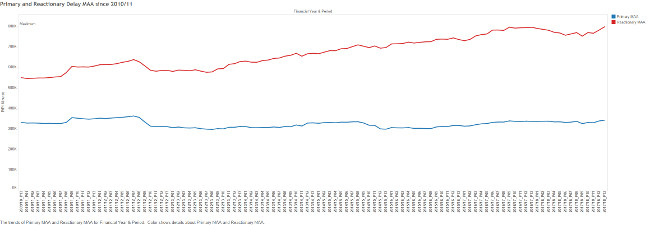Rail bosses have blamed ‘congestion on the network’ for an increasing number of incidents in which trains miss scheduled stops.
The BBC reported that more than 52,500 services out of a planned six million had one or more ‘failure to stop’ (FTS) events in the year to 23 February – an average of 160 a day.
In 2014-15 around 116 trains per day missed a stop.
Nearly a third of incidents in the last year (16,000) were trains run by Govia Thameslink (GTR) which runs Southern as well as Thameslink and Great Northern services.
The Rail Delivery Group (RDG), which represents train companies and Network Rail, said that while primary delays have remained stable, ‘reactionary' or knock-on delays have increased in the past five years.
Jacqueline Starr, the RDG's managing director of customer experience, pointed out that overall less than 1% of stops are missed. She said: ‘This only happens as a last resort to prevent delayed services causing further disruption and while we understand this is frustrating, we ensure there are alternative options for customers to continue their journeys.
‘While the number of incidents causing delays and cancellations is going down, each incident is having a bigger impact due to congestion on the network and this is something that we are working hard together to get right.’
Citing a freedom of information request, the BBC said that from April 2017 to February 2018, 17 in every thousand planned GTR trains missed one or more stops - about 50 per day and more than double the national average for train operators.
It said that over a four-year period an average of 14 in every thousand GTR services missed stations. South Western Railway, which took over the South West Trains franchise last August, averaged 11 and Southeastern averaged 10 in every thousand.
A GTR spokesman pointed out that there is no financial incentive to miss a stop 'because it counts as a partial cancellation, for which we incur a financial penalty'. He added: 'Skipping a stop is something we only ever do as a last resort, when a train running late would otherwise prolong the disruption.
'We operate the country’s most congested rail network and with a train departing every 27 seconds on average, even a minor delay to one train can cause a widespread and long-lasting knock-on effect to many other services and passengers across many routes.'
The BBC said the best performing firms were Heathrow Express, Chiltern, and Virgin Trains East Coast, with less than one in every thousand of their trains failing to stop.

The RDG said primary delays from incidents (blue) have stayed relatively stable but reactionary delays (red) have risen
Register now for full access
Register just once to get unrestricted, real-time coverage of the issues and challenges facing UK transport and highways engineers.
Full website content includes the latest news, exclusive commentary from leading industry figures and detailed topical analysis of the highways, transportation, environment and place-shaping sectors.
Use the link below to register your details for full, free access.
Already a registered? Login